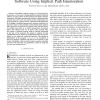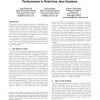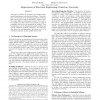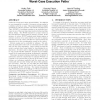14 search results - page 1 / 3 » Performance Analysis of Embedded Software Using Implicit Pat... |
124
Voted
DAC
1995
ACM
15 years 6 months ago
1995
ACM
—Embedded computer systems are characterized by the presence of a processor running application-specific dedicated software. A large number of these systems must satisfy real-ti...
123
Voted
DAC
2006
ACM
16 years 3 months ago
2006
ACM
Accurate estimation of the worst-case execution time (WCET) of a program is important for real-time embedded software. Static WCET estimation involves program path analysis and ar...
150
Voted
JTRES
2009
ACM
15 years 9 months ago
2009
ACM
This paper describes hardware methods, a lightweight and platform-independent scheme for linking real-time Java code to co-processors implemented using a hardware description lang...
132
Voted
DAC
1997
ACM
15 years 7 months ago
1997
ACM
This paper examines the problem of statically analyzing the performance of embedded software. This problem is motivated by the increasing growth of embedded systems and a lack of ...
142
Voted
CODES
2007
IEEE
15 years 9 months ago
2007
IEEE
Caches are notorious for their unpredictability. It is difficult or even impossible to predict if a memory access results in a definite cache hit or miss. This unpredictability i...




